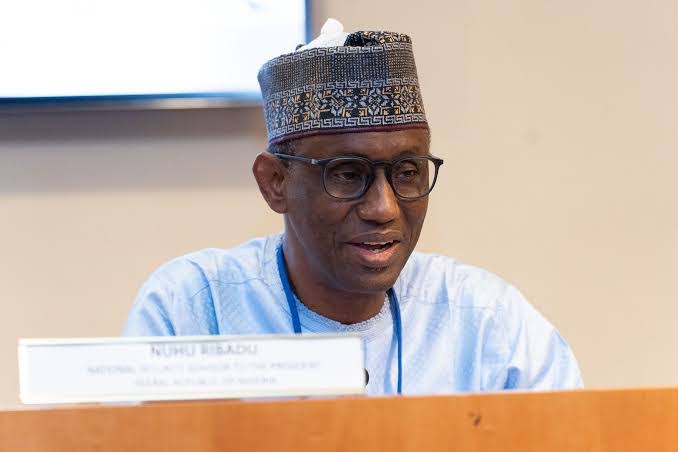

EFCC, Ribadu’s claims on seizure of $37m crypto address linked to #endbadgovernance protest false
Nigeria’s National Security Adviser, Nuhu Ribadu, has made unverified allegations about the citizen-led protests against hunger and deprivation in the country.
At Tuesday’s Council of State meeting in Abuja, Ribadu claimed that his office had discovered substantial financial assets linked to the protest’s organizers, including a cryptocurrency address allegedly holding $37 million. However, he did not provide concrete evidence to support these claims.
Ribadu suggested that politicians opposed to President Bola Tinubu’s administration might be behind the protests and stated that his office was investigating their financial connections. These claims, however, remain unsubstantiated and align with the government’s earlier narrative that the protests are politically motivated.
Following Ribadu’s statements, court documents surfaced on social media revealing a federal judge’s order to seize crypto accounts allegedly related to money laundering and terrorism financing. The timing of this revelation raises questions about the validity of Ribadu’s claims and possible government efforts to undermine the protests.
An investigation into the crypto addresses listed in the court warrant obtained by the Economic and Financial Crimes Commission (EFCC) found that the government’s claims about protest funding were largely fabricated and misleading. The investigation revealed discrepancies and inaccuracies, casting doubt on the government’s allegations.
On Tuesday, news outlets reported that the Nigerian government had frozen cryptocurrency assets worth over $37 million, allegedly linked to the organizers of the #EndBadGovernance protests. The Federal High Court in Abuja granted this order on July 9, following an ex parte application by the EFCC on August 8. The EFCC claimed these assets were proceeds of money laundering and terrorism financing, leading to the court’s decision to freeze the wallets.
The court hearing proceeded without opposition, allowing for an unchallenged presentation of the EFCC’s case. Justice Emeka Nwite ordered the freezing of the wallet addresses owned by individuals under investigation for money laundering and terrorism financing.
The largest wallet, according to the report, contained approximately $37 million in cryptocurrency, while the remaining wallets held smaller amounts. Despite the ex-parte warrant not naming specific individuals as sponsors of the protests, Ribadu’s vague remarks to the Council of State could be seen as an attempt to discredit the nationwide protests held from August 1-10.
Peoples Gazette’s investigation revealed that only one of the four addresses listed, TUpHuDkiCCmwaTZBHZvQdwWzGNm5t8J2b9, had funds amounting to $518,000 as of Wednesday evening. This account, however, belonged to a crypto firm, not an individual. Another wallet, TGVCWYLdeCyjmSpojd4n7hqfJp2ucwuGAx, contained only N273,000 (about $175), contrary to government claims. A third wallet, bclqd6803rg24sgh4pjaprvh47apvgmleps9zagdt, appeared invalid, showing no results on multiple platforms. The EFCC claimed this wallet held $90, but its validity is uncertain. Most notably, the government alleged that wallet TB37WWozkkenGVYWD7Do2N5WT2CedqDktJ contained $37 million. However, The Gazette’s investigation found this wallet empty and inactive, resembling an unused bank account.
A composite showing the crypto address the government claimed held $37 million actually reveals a zero balance and no transaction history.




